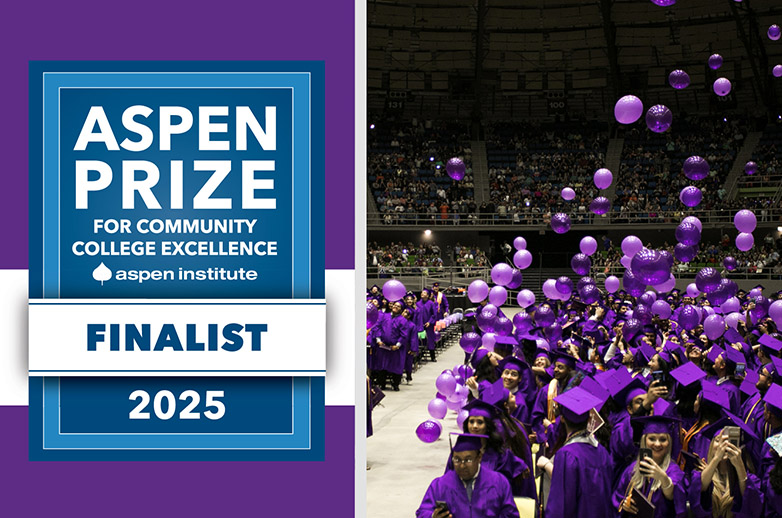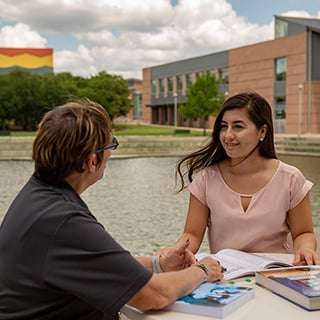NVC Named as a Finalist for Prestigious 2025 Aspen Prize
June 11, 2024

FOR IMMEDIATE RELEASE
WASHINGTON D.C., June 11, 2024 – The Aspen Institute named Northwest Vista College as a finalist for the 2025 Aspen Prize for Community College Excellence on June 11. The $1 million award is the nation's signature recognition of strong performance among community colleges. The institutions selected for this honor stand out among more than 1,000 community colleges nationwide as having high and improving levels of student success, as well as equitable outcomes for students from lower-income backgrounds.
“Reaching the top 10 community colleges in the nation is an incredible achievement, and it’s just the beginning. Northwest Vista College is committed to continuous improvement and proving the best possible education to our students and their families,” said Northwest Vista College President Dr. Amy Bosley.
Awarded every two years, the Aspen Prize honors colleges with outstanding performance in six critical areas: teaching and learning, certificate and degree completion, transfer and bachelor’s attainment, workforce success, broad access to the college and its offerings, and equitable outcomes for students of color and students from low-income backgrounds. The winner will be announced in the spring of 2025. NVC is one of only two community colleges in Texas to make the short list. The other Texas institution is San Jacinto College in the Houston area.
The Alamo Colleges District has a legacy of being recognized by the Aspen Institute. For the fourth consecutive time, Northwest Vista College received an invitation to compete at the national level for this prestigious award. San Antonio College earned the coveted Aspen Prize in 2021, while Palo Alto College was awarded a Rising Star in the 2019 Aspen Prize for Community College Excellence.
Josh Wyner, executive director of the Aspen Institute College Excellence Program, noted the Aspen Prize finalists not only deserve national recognition, but they also need to be studied and their successes replicated.
“Working-class Americans are experiencing an economy that seems to be stacked against them, while employers are struggling to find well-prepared workers in fields such as teaching, nursing, software development, welding, and advanced manufacturing,” Wyner said. “The 10 Aspen Prize finalists demonstrate how community colleges serving urban and rural communities throughout the country can prepare many more graduates for fulfilling lives and careers in their communities. They show that excellence can be reached in any and every context.”
The Aspen Prize selection process began in the summer of 2023 when Aspen analyzed data on 1,000 community colleges in key areas such as retention, completion, and transfer. In October, Aspen invited 150 community colleges to apply based on data showing high, improving, and equitable levels of student success. The 118 submitted applications went to a selection committee of 18 higher education experts who assessed each application based on extensive data and narrative answers to questions. Following interviews with leadership teams from applicants receiving top scores, 20 semifinalists were selected and announced in May. The committee continued its review and narrowed the field to the 10 finalists.
Next steps in the process include:
- Fall 2024: Multi-day in-person site visits to each of the 10 finalists, during which the Aspen Institute and partners will collect additional information and data, including extensive employment and earnings data on graduates from the finalist colleges.
- Winter 2025: A distinguished, independent Aspen Prize jury will review data and qualitative summaries that synthesize each part of the 14-month analyses, then meet for a full day to select the winner and others for additional recognition.
- April 17 2025: Announcement of the Aspen Prize winner and celebration of the 10 finalists in Washington DC.
The full list of this year's finalists and past winners can be found on the Aspen Prize webpage here: https://highered.aspeninstitute.org/aspen-prize/.
The Aspen Prize is generously funded by Ascendium, the Joyce Foundation, JPMorgan Chase, and the Kresge Foundation.
Note: Colleges that have won the Aspen Prize are not eligible to apply in subsequent years
The Aspen Institute College Excellence Program supports colleges and universities in their quest to achieve a higher standard of excellence, delivering credentials that unlock life-changing careers and strengthen our economy, society, and democracy. We know it takes visionary college leaders to lead scaled, sustainable reforms, and we make it our mission to equip them with the knowledge, skills, and research-backed tools to inspire change, shift practice, and advance the capacity of colleges to deliver excellent and equitable student outcomes. For more information, visit our website and follow us on LinkedIn and X.
The Aspen Institute is a global nonprofit organization whose purpose is to ignite human potential to build understanding and create new possibilities for a better world. Founded in 1949, the Institute drives change through dialogue, leadership, and action to help solve society’s greatest challenges. It is headquartered in Washington, DC and has a campus in Aspen, Colorado, as well as an international network of partners. For more information, visit www.aspeninstitute.org.
Contacts:
Renata Serafin, rserafin@alamo.edu
Director, Northwest Vista College Marketing and Strategic Communications
Kristin O’Keefe, kristin.okeefe@aspeninstitute.org
Director of Communications
Northwest Vista College (NVC), part of the Alamo Colleges District, is federally designated as a Hispanic-Serving Institution (HSI), an institution of higher learning with a full-time equivalent undergraduate student enrollment that is at least 25% Hispanic. As of Fall 2023, NVC’s Hispanic student enrollment is 66.2%. The college opened in 1995 with 12 students and has grown to one of the largest institutions of higher education in San Antonio and the region with current enrollment over 20,000 students. Located in Westover Hills, NVC’s expanding agreements with business and higher education partnerships provide a wealth of opportunities for students and the community.




